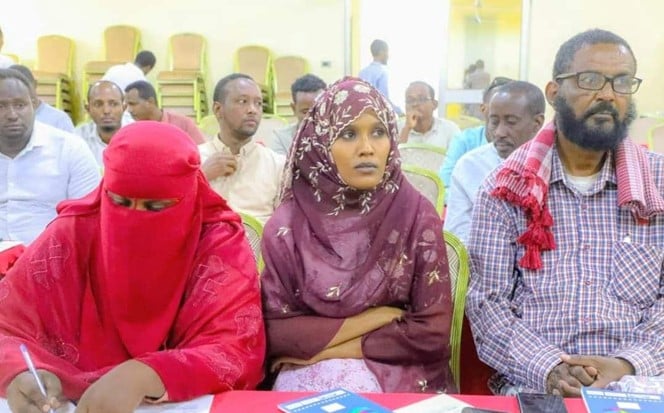"Empowering Health Sector: Afar Regional State Parliamentarians' Pledge to Drive Socio-Economic Development in the Region"

Introduction
According to the World Health Organization (WHO), Universal Health Coverage (UHC) will be achieved when everyone receives the necessary health services without facing financial hardships. Governments must allocate resources, ensure transparency and efficiency in healthcare expenditures, and involve citizens, civil society, media, and other stakeholders in holding them accountable for their policy and investment choices towards UHC.
The conflict and climate-induced crisis disproportionately affect vulnerable populations such as pastoralists and those living in remote and hard-to-reach areas. It's important to advocate for adequate allocation of public domestic resources for health and efficient use of those resources towards primary health care (PHC)/Universal Health Coverage (UHC) that includes primary health care[1].
Context
Afar Regional State faces significant challenges. Over 90 percent of the population relies on animal husbandry for their livelihood, and harsh weather conditions and unreliable rainfall patterns make the region prone to drought. Additionally, underdeveloped infrastructure and technology worsen the vulnerability of the population.
The Afar regional state has demonstrated a strong dedication to prioritizing and investing more in sectors that benefit the poor, such as infrastructure, education, and health over the past six years. It's noteworthy that funding for the health sector rose from 7.2% in 2014/15 to 13.48% in 2020/21 due to increased investment. However, there was a 5% reduction in allocation in 2021/22 and 2022/23 due to conflict in the north (Tigray). Thanks to the commitment of regional cabinets, the health sector became the second priority sector, receiving a 10% regional government allocation in 2023/24. Nonetheless, the region's health outcomes and service coverage indicators are the lowest compared to other regions in the country.
Save the Children budget advocacy asks
Advocacy activities supported by SCI aimed to educate and influence regional political leaders to increase the allocation for the health sector and improve health and social sector outcomes. To this end, Save the Children in collaboration with the Afar region health bureau generated compelling evidence on the health sector’s budget formulation, allocation, and execution compared with other sectors. Based on the evidence, the team developed a budget brief and advocacy strategy to educate and engage different stakeholders and primary targets. The region’s plan, budget, and financing and Social and health standing committees have been among the primary targets to influence and gain their support.
To achieve this objective, SCI, together with the Afar region health bureau, organized a high-level advocacy workshop. The workshop aimed to engage and influence the two standing committee members of the region’s parliamentarians in discussions on the importance of increasing and sustaining allocations for the health sector, with a particular emphasis on strengthening the efficient use of allocated budget and disbursement for primary health care. Apart from the members of the standing committees, the workshop was attended by key personnel from the bureaus of finance, health, and women & social affairs, as well as heads of parliamentarians at the office of the regional president.
On this occasion, Mr. Yasin Habib, the head of the Afar Regional Health Bureau, emphasized the critical importance of increasing and efficiently utilizing the health sector budget. The objective of the workshop is to underscore the necessity of proper budget allocation for the health sector, in line with the Abuja Declaration, which recommends that governments allocate at least 15% of their total budget to the health sector. Unfortunately, there has been poor budget allocation for district health offices in our region, leading to severe underfunding and ineffective delivery of essential health services. It is essential to ensure proper budget allocation for the health sector at both the regional and district levels.
Afterward, a senior expert from the health bureau presented a review of the health sector's performance, progress, challenges, and lessons learned in line with the health sector transformation plan (HSTP-II) for 2021-2025. The report emphasized significant underperformance in all key performance indicators compared to the HSTP-II targets for the region. Additionally, the SCI team provided a ten-year analysis of the health sector budget trends (allocation and execution) aligned with constitutional rights, health policy, global declarations, and recommendations for members of parliament.
Advocacy Success
His Excellency, Mohammed Ebrahim, representing the Afar Regional Parliament, forcefully emphasized the urgent need to increase and effectively allocate resources for the health sector. As the head of the Afar region MP, H.E. Mohammed Ebrahim wholeheartedly embraced the SCI budget advocacy for the health sector and passionately championed it in public. In his resolute address, the head of the regional parliament reiterated, "In my esteemed role and as a dedicated member of the regional parliament, I am unwavering in my belief that health is essential for the progress and prosperity of our society. I emphatically assert that the health sector demands and deserves greater attention, elevated priority, and the necessary budgetary allocation." Furthermore, H.E. Mrs. Medina Omer, a Member of the Regional Council, underscored the pivotal role of the Afar Regional Health Bureau and Save the Children International's unwavering efforts, highlighting the Regional Council's steadfast dedication to fulfilling the health needs of the community.

[1] WWW.UHC2030: A UHC2030 strategic narrative to guide advocacy and action, Geneva,2021




